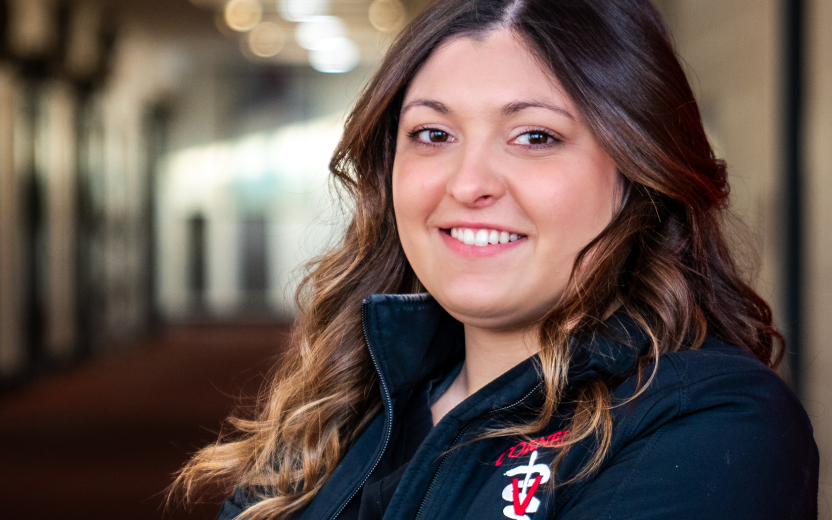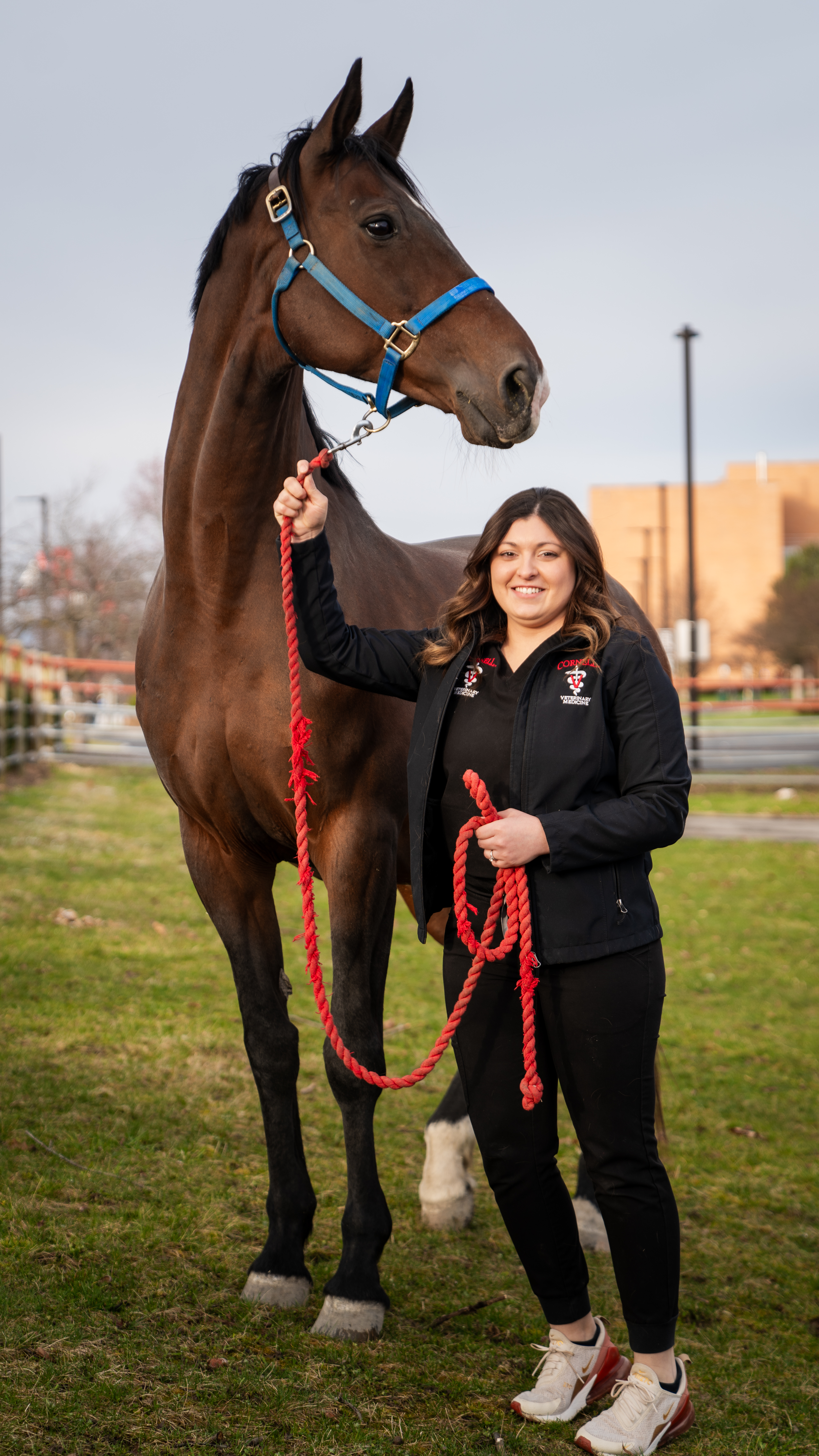Staff Stories: Mikaela Frost

LVT leads innovative internship program
By Grace DePaull
On any given day, licensed veterinary technicians (LVTs) at Cornell may find themselves diving into the intensity of the operating room, administering medications, managing inventory and equipment, teaching technical skills to students or performing diagnostic tests – their steady hands and sharp minds contribute to the world-class care of nearly 35,000 animal patients that arrive at Cornell University Hospital for Animals (CUHA) each year.
In addition to these demanding clinical duties, a group of LVTs at the Cornell University College of Veterinary Medicine (CVM) has been working closely to build a more sustainable future for their profession. Launching in the summer of 2024, a one-year paid rotating internship program will be available for four LVTs to have a unique opportunity to gain knowledge and experience within the specialty and emergency sectors of the field.
At the helm of the program is Mikaela Frost, an LVT in large animal surgery at Cornell, who serves as the chair of the LVT internship committee and co-chair of the LVT preceptorship committee.
“This experience is hard to find anywhere else,” Frost said. “We have a special opportunity at Cornell as a referral and teaching hospital to immerse our interns in nearly every specialty service available. The goal is for our interns to become well-rounded technicians who can be assets to any team at the completion of the internship. Whether they decide to stay with CUHA or move on, they will be great technicians regardless.”
Frost’s passion for veterinary medicine emerged at a young age. At ten years old, she began volunteering at a local animal clinic and was inspired to become an LVT. After arriving at Cornell in 2017, Frost began her career in a large animal emergency and nursing care position before transitioning into the operating room.
For the past year, Frost, alongside nine other LVTs, has worked diligently to form a committee to design and implement the internship program at CVM. The committee met twice a month to solidify logistics before presenting their plans to key faculty and staff. The internship program is an embodiment of the collective minds, efforts and aspirations of LVTs at Cornell.
According to Frost, the program will provide LVTs with an immersive experience and take advantage of the opportunity to explore specialties in veterinary medicine, such as surgery and imaging. This program differs from the already existing Veterinary Technician Preceptorship Program at Cornell, which is a six-week program designed for current veterinary technician students between their first and second years of schooling. Instead, the LVT internship program invites post-graduates to gain a more thoughtful approach to potential careers, resulting in less turnover and more workforce experience. It also serves as a pipeline to employment opportunities at the university.
“Cornell is unique in creating this program,” Frost said. “There are only a few nationwide, and we’re among the first to implement it. We’re trying to break the barrier and misconception that you must have a lot of experience to come to Cornell and be an LVT. With programs like this, it’s a great opportunity for technicians fresh out of school and those who have been in the field but are looking for something more and want to dip their toes in the specialty practice and see what it's about.”
Currently, there is a significant need for technicians in New York State and nationwide. Frost hopes that by the end of the program, interns will feel more marketable for specialty and emergency hospital positions, and she has crafted the program to reflect this purposeful approach.
“The key to success is starting slow with four interns to allow us to perfect the program. Its structure and sustainability are really important because we want to make sure it’s successful and we're able to do it again year after year,” Frost said.
The first inaugural class of 2025 will arrive on campus in June 2024 to begin their rotations. Four interns will be offered acceptance this year – two interns in small animal rotations at the Companion Animal Hospital and two interns in large animal rotations at the Equine and Nemo Farm Animal Hospital. With a caseload of thirty-five thousand domestic and exotic species, interns will have the opportunity to enhance their technical skills in the field alongside a team of veterinary students, interns and residents. After the completion of the first year, Frost is optimistic that they will be able to increase the number of accepted interns in the following years.
“We learned that the veterinary teaching hospital is a dynamic institution, always evolving and ready to accept a challenge. When the college saw that teaching and development would lie at the center of the program, along with a viable career path for the graduating interns, everyone was on board,” Frost said.
Frost acknowledged Lorin D. Warnick, the Austin O. Hooey Dean of Veterinary Medicine, CUHA leadership and CVM’s human resources recruitment team for instrumental support in facilitating the program’s success and helping bring it to life after LVTs in the field vocalized its need. She also credits her colleagues who felt empowered to address workforce challenges and demonstrated creativity and innovation in addition to their intensive clinical responsibilities.
“I'm proud of the team for coming together, which is no easy task,” Frost said. “During this experience, we’ve had a clear vision from the start and wanted to create a sustainable process. Teaching other LVTs and our interns is my passion, and it's a component of my job that has enhanced my experience at Cornell. I’ve really enjoyed leading the program and am excited to see it take us to the next level.”
For more information on the LVT internship program, visit Cornell Career Opportunities.

